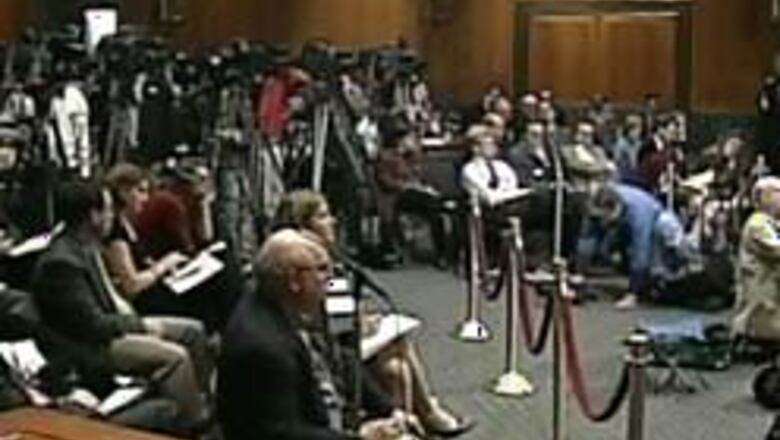
views
Washington: The Indo-US nuclear deal appeared poised to clear its last legislative hurdle as the Senate completed a two-and-a-half-hour debate on Wednesday with members from across the political divide supporting the landmark accord.
But a vote would be taken on the approval bill HR 7081 - passed by the House of Representatives on Saturday by a margin of 298-117 - only after 7.30 p.m. (0500 hrs IST, Thursday) in view of the Rosh Hashanah Jewish holiday.
Initiating the debate at 10.15 a.m.(1945 hrs IST), Christopher Dodd, acting chairman the Senate Foreign Relations Committee, called for the bill to be passed overwhelmingly as a strong signal of US support for a new relationship between the countries after years of cool ties.
Dodd, standing in for committee chairman Joe Biden, who is also the Democratic vice presidential candidate, spoke of "compelling geopolitical reasons" to move forward with the deal, noting India's proximity to Pakistan, China and Afghanistan.
Richard Lugar, top Republican member in the Senate Foreign Relations Committee, said the accord would protect US national security and non-proliferation efforts while building "a strategic partnership with a nation that shares our democratic values and will exert increasing influence on the world stage".
Describing the India deal as "one of the most important strategic diplomatic initiatives undertaken in the last decade", he said: "By concluding this pact, the US has embraced a long-term outlook that will give us new diplomatic options and improve global stability."
The two also opposed two amendments introduced by Byron Dorgan and Jeff Bingaman, both Democrats, seeking to ensure that US nuclear exports to India do not help boost India's nuclear weapons programme. The two senators later combined their amendments into one.
Dorgan said the bill "will almost certainly expand the production of nuclear weapons by India" and help dismantle the architecture of the Nuclear Non-Proliferation Treaty, the global agreement that provides civilian nuclear trade in exchange for a pledge from nations not to pursue nuclear weapons.
He also criticised the speed of action on the measure, saying, "Never has something of such moment and such significance and so much importance been debated in such a short period of time and given such short shrift.
"This message is: you can misuse American nuclear technology and secretly develop nuclear weapons; you can test those weapons; you can build a nuclear arsenal in defiance of the UN resolutions, and you will be welcomed as someone exhibiting good behaviour with an agreement with the United States of America," Dorgan said.
"What message does that send to others who want to join the nuclear club?"
Bingaman acknowledged "the deep and very important ties" with "India, a great leader in technology that needs to be our ally on a number of issues", but said a line must be drawn on the non-proliferation issue given its serious consequences.
The approval of the agreement would make India a de facto nuclear weapons power without the responsibilities of a signatory of Nuclear Non-Proliferation Treaty (NPT), he said. "India gets to eat its cake and eat it too."
Given that the bill has bipartisan support, the amendments that need to secure 60 votes in the 100-member chamber are expected to be defeated.
But their passage could complicate matters as the approval bill then would have to go back to the House as President George W. Bush, who has given "very, very high priority" to the deal, can sign into law only identical bills adopted by the two chambers.
Dodd said though the bill before the Senate was "certainly not perfect" it had largely addressed the questions raised by the two senators. And while he would not deplore it as a "killer amendment", its adoption would ironically defeat the very purpose for which it was moved. It would only let "perfect to be the enemy of the good".
For with the Senate passing a different bill than the one adopted by the House, there will be little time to reconcile the two and the next president will simply have to wait it out to get the implementing 123 agreement approved by the Congress in an up-or-down or yes-or-no vote without the oversight provisions added by the House bill.
The House approved bill also has a paragraph that the US can cease nuclear cooperation with India if New Delhi conducts a test.
The Dorgan and Bingaman amendment makes it more explicit saying, "Notwithstanding any other provision of law, the US may not export, transfer, or re-transfer any nuclear technology, material, equipment, or facility under the Agreement if the Government of India detonates a nuclear explosive device after the date of the enactment of this Act."
It also proposed that if India detonates a nuclear weapon after the date of the enactment of the Act, the US president has to certify to Congress that no American technology, material, equipment, or facility supplied to India under the Agreement assisted New Delhi's test.




















Comments
0 comment